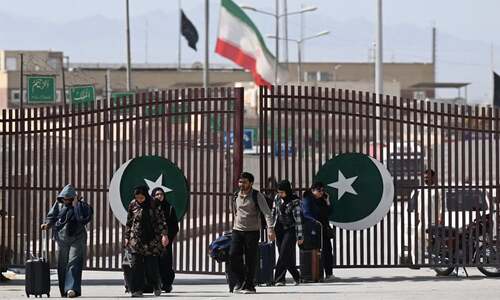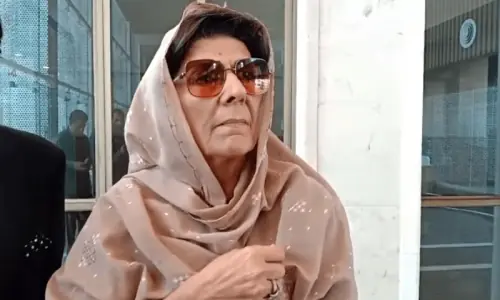ISLAMABAD: Human rights organisations and defenders called upon the government on Monday to protect prisoners from coronavirus.
In a joint statement, they asked the government to take rapid action to ensure that inmates and staff of prisons are provided adequate protection as cases of Covid-19 continue to increase across the country.
The statement was issued by the Human Rights Commission of Pakistan (HRCP), Human Rights Watch (HRW), Foundation for Fundamental Rights (FFR), Justice Project Pakistan (JPP), Asma Jahangir (AGHS ) Legal Aid Cell, Public Lawyers Front (PLF), Defence of Human Rights (DHR), Legal Aid Society, Free Legal Aid Society For The Helpless (FLASH), Pakistan Bar Council (PBC) vice chairman Abid Saqi and members of Permanent Faculty, Shaikh Ahmad School of Law, LUMS, K. Asdar Ali, S. Aziz, S. Shah and Mohammad Azeem.
On Saturday last week, a petition was filed in the Supreme Court, seeking a directive for the federal government to immediately declare a national public health emergency across the country in the wake of the coronavirus pandemic, set up an emergency relief fund by utilising the dams fund and release under-trial prisoners and those convicted of minor offences.
The statement by the human right organisations also recalled a recent order of Chief Justice Athar Minallah of the Islamabad High Court in which he observed that the confined space of a prison made it virtually impossible to implement social distancing.
The high court had also observed that the prisoners were vulnerable and likely to suffer irreparably in case of an outbreak, adding that the prisons, which were overcrowded, had high turnover and intolerable living conditions that could potentially become epicentres for outbreak of the deadly virus.
Supporting the observations, the statement said the unhygienic and overall poor condition of prisons in Pakistan had been extensively documented. An earlier report this year had showed that contagious and chronic infections such as HIV, hepatitis and tuberculosis were already rampant within the prison populations, the statement said.
Additionally, prisons across the country are filled well beyond their capacity and of the current inmate population of more than 77,275 people, more than half are still awaiting trial and are in jail for crimes for which they have not yet been convicted, the statement recalled.
In the light of the gravity of risks posed to prisoners and the wider population, the IHC had also ordered that the under-trial prisoners alleged to have committed offences falling within the ambit of the non-prohibitory clause should be granted bail. The high court had also noted that elderly prisoners and those who suffer pre-existing health conditions should also be considered for release. In the light of the extraordinary duty of care that the government owes to prison inmates and to the population at large to reduce the impact of coronavirus and enable everyone to seek to implement measures for isolation and care within their own homes.
The joint statement called upon the federal and provincial governments to consider urgently releasing persons who should not be in custody in any case, including those detained for peaceful exercise of their fundamental rights to speech, assembly or any other right granted under the Constitution and international human rights instruments.
Similarly, it added, all prisoners, including under-trial and convicted, whose offences fall within the ambit of non-prohibitory clauses should be released immediately. Likewise, the pre-trial and under-trial detainees, who pose no imminent threat to public security and those whose trials are delayed on account of the coronavirus outbreak, should be released.
Detained asylum-seekers and migrant children should also be freed and in cases where the provincial governments are empowered under the Pakistan Prison Rules, 1978 and Section 401 of the Code of Criminal Procedure to suspend sentences, those who have served a significant portion of their sentences and are not considered to pose a threat to public safety should be considered for release, the statement demanded.
It said that those in prisons with underlying health conditions or those above the age of 55 who are not considered a threat to public safety, should also be released since they are particularly vulnerable to the virus. Likewise, female inmates who do not fall within these categories but who have minor children requiring care during this public health emergency, should be accorded suspensions or commutations where there is no reason to believe that their release will imperil public safety, the statement said.
The federal and provincial governments must also work through the Inspectorate General of Prisons to identify inmates who fall within these categories so that detainees should not have to file individual applications. This will avert a catastrophic burdening of the court system, it said, adding that prior to release, all persons should be given a health screening and provided the means to return to their homes and abide further health and public safety advisories.
The government must demonstrate cognizance of the fact that these are extraordinary circumstances and that people must have the means to survive without employment for some period of time, the statement said. “Lastly, we would urge that the federal and all provincial governments to make their plans to reduce the risk of coronavirus within their facilities,” it added.
Published in Dawn, March 24th, 2020
































